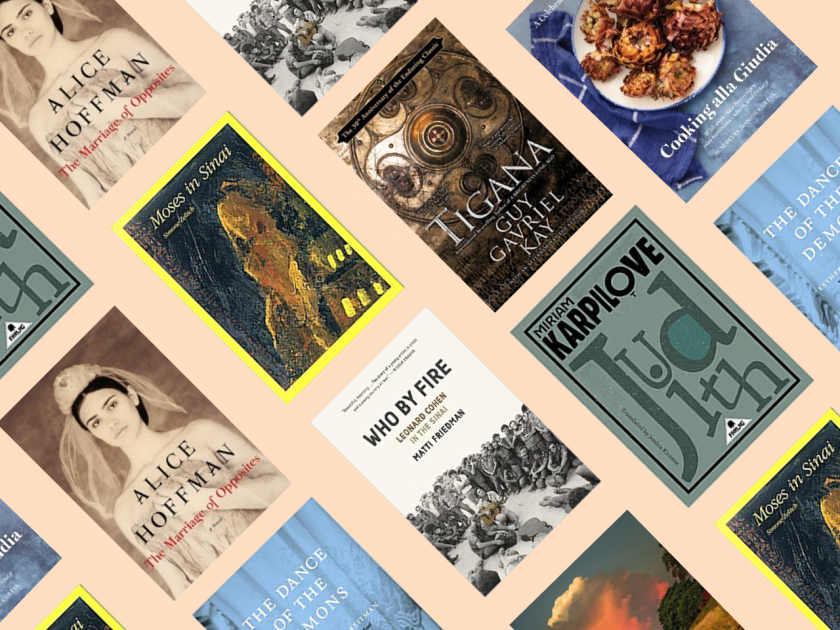
The story of Passover asks questions that have resonated with generations of people from all over the world. With this in mind, we asked ten writers to share a book they would recommend reading over the holiday. Touching on themes of exile, memory, social justice, freedom, and more, these suggestions will keep you booked for more than eight days (or seven, if you’re in Israel!).
Rachel Barenbaum, author, most recently, of Atomic Anna
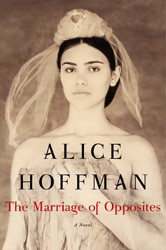
The Marriage of Opposites by Alice Hoffman
The Marriage of Opposites by Alice Hoffman is a perfect Passover book because it focuses on a small Jewish community living in St. Thomas in the 1880s, a community forced to flee during the Inquisition. A tour de force written with gorgeous language and passionate prose, Hoffman’s book brings the characters of Rachel and Frédérick to life and brilliantly illuminates their love. Hoffman follows their journey and their next generation that includes their son, the now-famous painter Camille Pissarro. Based on real events and real people, I couldn’t put it down and recommend it all the time. It’s one of those books I never wanted to end.
B. A. Van Sise, author, most recently, of On the National Language: The Poetry of America’s Endangered Tongues
I come from a mixed background, but many of my ancestors came from North African, Greek, and Italian Jewish communities – groups that are, perhaps, lesser known here in the US. I love Pesach: it tends to be the time of year when I find myself checking in with the ancestors, and, in turn, checking in with myself. The frontiers between generations all seem a little softer with the summoning of springtime.
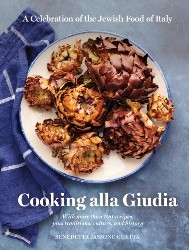
Cooking alla Giudia: A Celebration of the Jewish Food of Italy by Benedetta Jasmine Guetta
So much of our memory is tied to scent, and this year I’m thinking a lot about Cooking alla Giudia: A Celebration of the Jewish Food of Italy by Benedetta Jasmine Guetta. A book that, holding in my hands, I can smell, the pages turned by my grandmother’s hands as much as my own. It also discusses – perhaps confronts is the better word, here – how this historic community handles a flourless holiday in a nation built out of pasta.
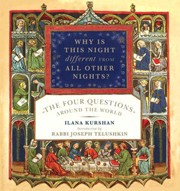
Why Is This Night Different from All Other Nights?:“The Four Questions” Around the World by Ilana Kurshan
Also on my mind is Ilana Kurshan’s Why Is This Night Different from All Other Nights?:“The Four Questions” Around the World. Not exactly a children’s book but perhaps most beneficial for young readers, it brings the famous questions into twenty-three different languages spoken now and historically by far-flung diasporic communities: lots of places that are, perhaps, less familiar but whose frontiers of past and future are just as thin this time of year.
Sacha Lamb, author, most recently, of The Forbidden Book
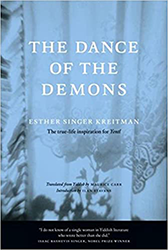
The Dance of the Demons by Esther Singer Kreitman, translated by Maurice Carr
I recommend two books translated from Yiddish, The Dance of the Demons by Esther Singer Kreitman (translated by Maurice Carr) and Judith by Miriam Karpilove (translated by Jessica Kirzane). Kreitman, the elder sister of the famous Singer brothers, draws a portrait of a girl driven nearly mad by her desire and inability to access the spiritual education her brother isn’t even interested in receiving.
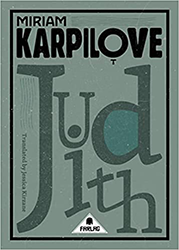
Judith by Miriam Karpilove, translated by Jessica Kirzane
Karpilove’s heroine longs for revolution but is let down by her revolutionary lover. Each yearns for intellectual freedom in a highly gendered society. I love these portraits of frustrated young women who deserved better.
Ruth Behar, author, most recently, of Across So Many Seas
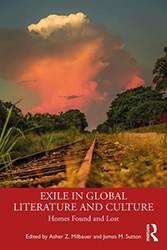
I can’t think of a more perfect book to read for Passover than the recent anthology, edited by Asher Milbauer and James Sutton, entitled Exile in Global Literature and Culture: Homes Found and Lost. A wide range of authors address the meaning and experience of exile from personal and scholarly perspectives. Readers will be illuminated about Jewish and classical Roman notions of exile, as well as those of Shakespeare, James Joyce, and Elie Wiesel.
Chilean Jewish writer Marjorie Agosín discusses the tablecloth of memories in her family, and Cuban-American novelist Ana Menendez and poet Richard Blanco address the strange experience of being children of exiles and growing up with mirages of a lost homeland.
Ari Shapiro, author, most recently, of The Best Strangers in the World: Stories from a Life Spent Listening
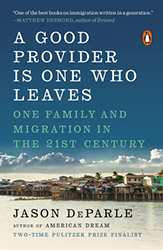
A Good Provider Is One Who Leaves: One Family and Migration in the 21st Century by Jason Deparle
The Passover story helps me understand present-day stories of migration. One of the best books I’ve read on that theme is Jason DeParle’s, A Good Provider Is One Who Leaves: One Family and Migration in the 21st Century. DeParle met the Filipino family at the center of the narrative in 1987. Over decades, he followed their experiences as they took jobs in Saudi Arabia, UAE, and the United States. By tracing this massive global phenomenon through intimate personal stories, he brings nuance and depth to a subject that is in the news nearly every day.
Helene Wecker, author, most recently, of The Hidden Palace
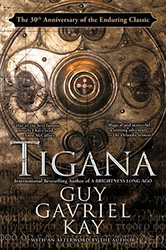
Tigana by Guy Gavriel Kay
What if your homeland vanished so thoroughly that no one could even say its name? In a magic-infused world reminiscent of Renaissance Italy, a sorcerer king conquers the land of Tigana, erasing its name and its history in revenge for the death of his son. Twenty years later, a band of exiles schemes to lift the curse. This 1990 novel by Canadian Jewish author Guy Gavriel Kay was a formative read for me, and has lost none of its own considerable magic.
Ranen Omer-Sherman, author, most recently, of Amos Oz: The Legacy of a Writer in Israel and Beyond
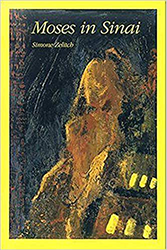
Moses in Sinai by Simone Zelitch
In considering the most imaginative and spiritually stirring exemplars of contemporary literary midrash, Simone Zelitch’s remarkable novel Moses in Sinai always springs to mind. As she tells it, the inspiration for the novel arose at her Jewish high school when “a rabbi warned us not to be like the infamous Korah who led a rebellion against Moses and was swallowed alive. Being an alienated seventeen-year-old, I immediately read and reread Korah’s story, as well as rabbinic commentary.” Years later that exploration led to the novelist’s stirring consideration of rebellion and dissent in the Jewish tradition. In her richly psychological retelling of Exodus, both Moses and those who are left uneasy by his unquestioning obedience to a hidden and inscrutable divinity are portrayed with deep sympathy and acute moral imagination. At one point, a character pleads with Moses not to abandon the egalitarianism of their desert wanderings: “Canaan means the end of everything. Once we have land we have owners…if we have Canaan we’ll have lords again. We’ll be like everyone else. We’ll have masters and slaves. You don’t want that.”
Ilan Stavans, author, most recently, of Sabor Judío: The Jewish Mexican Cookbook
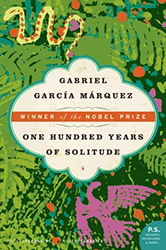
One Hundred Years of Solitude by Gabriel Garcia Marquez
This magisterial novel — I have read it twenty-seven times — is a biblical retelling of Latin America. Its structure is made of concentric circles. At the center is a mythical town, Macondo, on the Caribbean side of Colombia; and within it is a family, the Buendías, and a house, where love and solitude push people to the verge. I can’t think of a better book to reckon with concepts such as exile, freedom, memory, and justice. Plus, the Wandering Jew makes a cameo appearance.
Alina Adams, author, most recently, of My Mother’s Secret: A Novel of the Jewish Autonomous Region
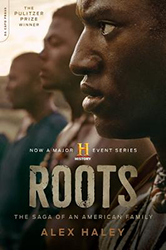
Roots by Alex Haley
My family and I arrived in the US from the Soviet Union on January 19, 1977. The following week, ABC aired the eight-episode miniseries Roots. Six years later, when on work-study at my school library, I found a copy of the novel that inspired the series. I hid it away and would sneak off to read it when I was supposed to be shelving. Despite the significant differences between my experience and that of Haley’s characters, the themes of exile, persecution, family separation, escape, and freedom resonated with me. It is striking that “Go Down Moses,” a spiritual sung by enslaved persons, is a reference to the Passover story.
Iddo Gefen, author, most recently, of Mrs. Lilienblum’s Cloud Factory
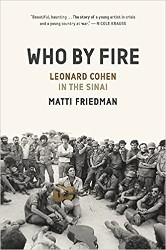
Who By Fire: Leonard Cohen in the Sinai by Matti Friedman
It seems that there is something about the desert in the Sinai that makes nations and people rediscover themselves. Not only did the Exodus take place in the desert, butLeonard Cohen’s journey deeper into himself and his Jewish identity occurred there during the Yom Kippur War. In this extraordinary book, Matti Friedman not only tells the story of one of the greatest musicians of the twentieth century, but of a person who reshapes his past and future during a difficult and complex situation, like the people of Israel did during their forty-year walk in the desert.